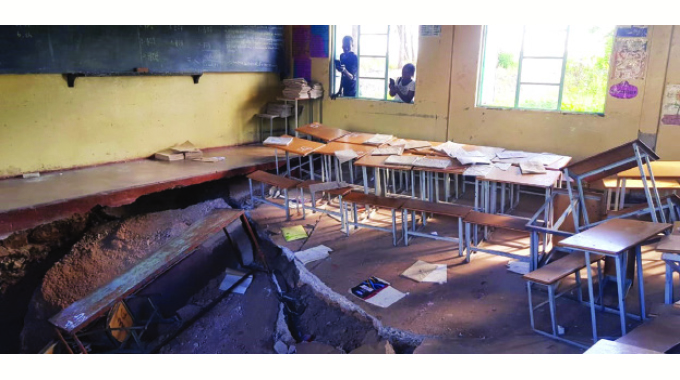EDITORIAL COMMENT: Illegal gold mining needs to be blocked in special effort

Illegal miners are becoming ever more daring, digging under houses, schools and roads and not just ignoring rights of other land users, but creating positive dangers that have already injured people and, unless stopped, will soon kill someone.
This is besides the farm land that is being degraded and made unsuitable for any farming, and which is not being environmentally restored so that at least it can be used by cattle grazing as fertility is restored.
At least 100 000 hectares of land have been severely degraded according to the Environmental Management Agency along with 1 555km of river banks.
Yet even in its present form the mining law should be effective in preventing the worst of the damage, sorting out conflicts between surface users and miners, and assessing compensation when decisions are made in advance that a particular plot is significantly more valuable as amine than the existing use.
None of this is new to Zimbabwe, and all that proposed amendments to the law, bogged down at the moment over Constitutional issues, is to make what we made better and easier to apply rather than make any fundamental changes to our concepts of land use.
The latest threat to life and limb comes from the Globe and Phoenix Compound in Kwekwe, where a underground tunnelling caused two rooms in a flat to collapse last week. Fortunately the family in the house escaped, but it could easily have been otherwise if anyone had been standing in the one of the rooms.
The same area 11 weeks ago said 17 children injured when their classroom as the Globe and Phoenix Primary School fell into a large hole hollowed out by illegal miners.
This was more serious and yet it is obvious that the illegal activity did not stop, since now a house has collapsed and residents in the area report that they can continually hear the sounds of digging beneath their feet, and even explosions at times.
The Globe and Phoenix was Zimbabwe’s richest gold mine for decades in the colonial era, although it appears the then mine owners at least had enough sense not to tunnel underneath the housing of their workforce.
Self interest might have been the main factor rather than a desperation to obey mining law. But in recent years small-scale miners have been moving into the site and just digging for the scraps still left and efforts to stop them have been ineffective.
Small-scale mining provides employment for a lot of people, and it would be quite wrong to ban it, as the colonial authorities tried very hard to do.
But as with so many other activities it needs to be licensed, regulated and probably insured, and if our mining law needs to be amended to make this practically possible then we must design and enforce the necessary amendments.
After all farmers need to be registered to grow tobacco and several other crops, and the Tobacco Industry Management Board does a sterling job in ensuring that every tobacco farmer, even the small with just half a hectare, is registered and numbered.
Admittedly farmers need to be on a fixed piece of land, so have a permanent address and can be visited easily, but it should not be beyond the imagination of bureaucrats to design something similar for the bottom tier of miners.
The mineral rights of Zimbabwe are owned by the State, as is much of the land, so there is the potential for the State to be the referee in any dispute, but to do that function it needs to know who every farmer and miner is.
It knows the farmers, regardless of whether they have a communal right, an offer letter for resettlement land, a lease or a title deed.
The data banks down at the Ministry of Lands, Agriculture, Fisheries, Water and Rural Development certainly have details of all active farmers, and a lot of information on land holders who are not making use of their land. The present audit, which is now almost complete, is filling in the knowledge gaps.
We now need every miner registered and licensed, and the authorities able to move around demanding to see these licences. The big companies are obviously all properly listed, are subject to safety inspections and generally are law abiding.
Even many small, but formal mines are in the same categories; there might be the odd problem but these can be swiftly sorted out. These miners are in some what a bit like farmers, they mine a specifically assigned piece of land, have an address and can be readily found and inspected.
There are a whole lot of rules developed over many decades over what happens when the miner and farmer can be in conflict. Sometimes this is best sorted out by the farmer moving, but the miner either buys the land at full price if it is on a title deed, or pays the full compensation of all the farmers has on the land and pays for the relocation.
A gold mine is likely to earn more than a few fields of even quality tobacco. So this largely works, and just needs to be enforced.
The problem comes from the shifting illegal artisanal miners, who are not registered, are not licensed and do not even have a fixed abode. They have simple equipment and just dig where they wish, how they wish and when the wish. Mine safety is a foreign concept, and fairly obviously so is the safety of everyone they come into contact with.
Yet we have sorted out a lot of similar troubles within the mining world. When alluvial diamonds were discovered early this century there was a free-for-all in some areas, and some exceptionally undesirable people were involved.
The authorities stepped in, sorted everything out and diamond mining is now a properly organised and regulated industry. A few years ago illegal gold miners organised themselves into gangs armed with machetes. The police reacted, with full Government backing, and tamed the gangs and brought respect for the law.
At the moment the Ministry of Mines and Mining Development is creating a proper electronic database of all prospecting and mining claims, and the huge advantage of that is that it does not matter how large or small a claim is, even if it is as small as 1ha.
It is like tobacco farming where the expansion from a couple of thousands estate owners to tens of thousands of small-scale farmers was successfully caught on a database.
The Environmental Management Agency as well as the Mines Ministry need access to that mining database, but it then becomes simple to register every miner, from the person with a pick, shovel and wheelbarrow all the way to the multi-million dollar corporation.
Then the enforcement becomes possible: you either have a licence in your pocket on a designated bit of land or you go to court.











Comments